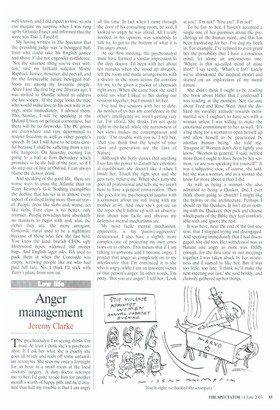Anger management
Jeremy Clarke
Thepsychoanalyst I'm seeing thinks I'm mad. At least I think she's a psychoanalyst. If I ask her what she is exactly she goes all bristly and reels off some unfamiliar acronyms. She secs me once a fortnight for an hour in a small room at the local doctors' surgery. A duty doctor referred me to her. I'd gone to see him for another month's worth of happy pills and he'd intuited that half my trouble is that I am angry
all the time. In fact when I came through the door of his consulting room, he said, I looked so angry he was afraid. All I really needed, in his opinion, was somebody to talk to, to get to the bottom of what it is I'm angry about.
At our first meeting, the psychoanalyst must have formed a similar impression to the duty doctor. I'd been with her about ten minutes when she stood up abruptly, left the room and made arrangements with a doctor in the room across the corridor for me to be given a packet of chemicals right away. When she came back she said I could say what I liked to her during our sessions together, but I mustn't hit her.
I've had five sessions with her to date. As neither of us has any confidence in the other's intelligence we aren't getting very far. I'm afraid, She thinks I'm not quite right in the head, while the narrowness of her views makes me contemptuous and rude. 'The trouble with you is,' I tell her, 'that you think that the tenets of your class and generation are the laws of Nature.'
Although she hotly denies that anything I say has the power to disturb her emotional equilibrium, she doesn't like it when I insult her. Touch the right spot and she gets ratty. believe me. When she's ratty she goes all professional and tells me we aren't here to have a general conversation. Then she goes for my psychological jugular with a comment about my still living with my mother at 46. And once she's got me on the ropes she'll follow up with an observation about how facile and obvious my defensive mental mechanisms are.
My most facile mental mechanism, apparently, is my 'passive-aggressive' demeanour. I also have a slightly more complex one of projecting my own emotions on to others. This means that if I am talking to someone and I become angry, I project that anger so completely on to my interlocutor that I'm convinced it is she who is angry, while I am an innocent victim of that person's anger. In other words, I'm potty. 'But you are angry!' I tell her. 'Look
at you!' I'm not!' 'You are!' 'I'm not!'
To be fair to her, I haven't accepted a single one of her premises about the psychology of the human mind, and this has been frustrating for her. I've dug my heels in. For example. I've refused to even grant her the possibility that I have a conscious mind, let alone an unconscious one. 'Where is this so-called mind of mine then?' I say testily. 'What's it for?' Lately we've abandoned the medical model and started on an exploration of my moral nature.
She didn't think I ought to be reading the book about Hitler that I confessed I was reading at the moment. Nor the one about Fred and Rose West. And she disliked my cavalier attitude towards extramarital sex. I oughtn't to have sex with a woman unless I was willing to make the emotional commitment to her as well. 'It's a big thing for a woman to open herself up and allow herself to be penetrated by another human being,' she told me. 'Imagine it! Women don't do it lightly you know.' 'Women in general.' I said, nettled more than I ought to have been by her sermon, 'or are you speaking for yourself?' It was a subjective view, of course, she said, but she was a woman, and as a woman she knew far more about it than I did.
As well as being a woman, she also admitted to being a Quaker. Did I ever think about going to church? I might like the hymns or the architecture. Perhaps I should try the Quakers. It isn't all or nothing with the Quakers; they pick and choose which parts of the Bible they feel comfortable with and ignore the rest.
It was here, near the end of the last session. that I stopped trying and disengaged. And spotting immediately that I had disengaged, she did too. Her withdrawal was as blatant and angry as mine was. Oddly enough, for the first time in our meetings together I was taken aback by her astuteness and I started to like her. But it was too little, too late. think we'll make the next meeting our last,' she said briskly, and clumsily gathered up her things.


































































































 Previous page
Previous page